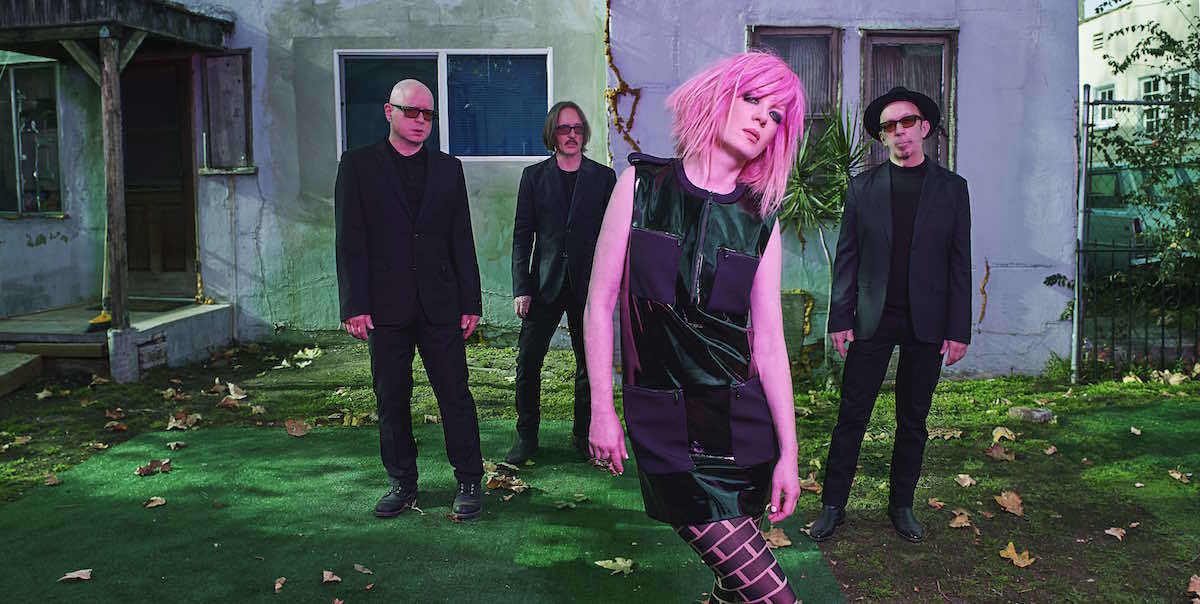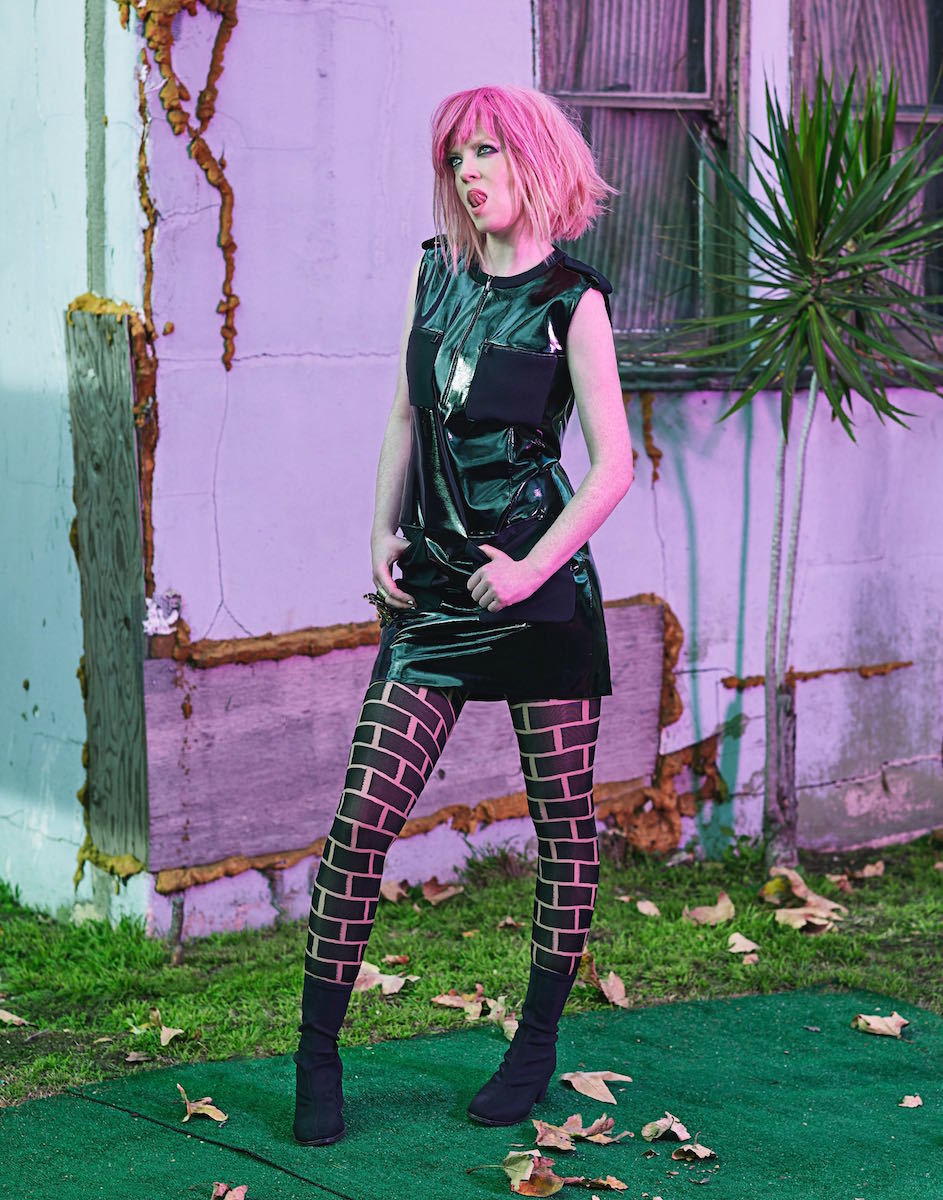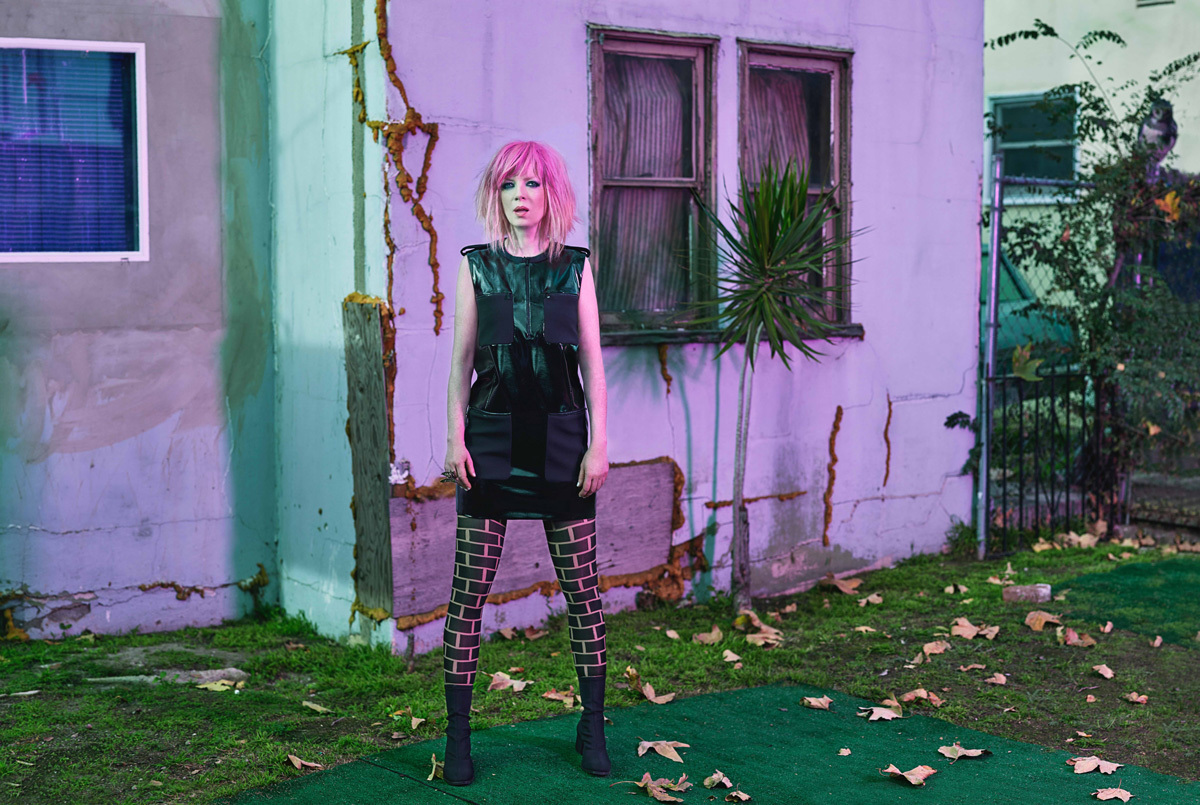From a polite upbringing in Edinburgh, Garbage’s Shirley Manson followed a path of rock and roll to Madison, Wisconsin to spend a decade in a properly-huge, arena-filling rock band. On singles “Stupid Girl,” “Only Happy When It Rains,” and “Queer,” Manson was the no-nonsense Scottish lass with the throatiest laugh in music — an icon in boots who exerted a charismatic hold over a generation and bagged a James Bond soundtrack in the process. She was, at once, rock and roll, feminism, gay rights, transgender rights, lust, sex, violence, Chrissie Hynde, and Debbie Harry. And now, 21 years since the release of its eponymous debut, Garbage, her band is back with album number six, Strange Little Birds — a brand new record of trademark twists and turns, loud and quiet, their best in fifteen years. We sat down with Shirley and can confirm that that magnificent laugh remains very much in tact (and is, by no means, deployed sparingly). So go buy the new album, go see the tour, go dye your hair pink and go gaga for Garbage. You know we are.
Do you like doing interviews?
Sometimes, it depends.
You seem quite candid.
I’m very candid. If nothing else in my life, I can say with great confidence I am candid! For better or for worse, I guess.
Obviously you did a whole spate of interviews for the 20th anniversary of Garbage stuff last year. Was it weird revisiting that record in such depth?
It was really super weird. It’s much like going back over your old school photographs or something. Sort of funny and cool and amazing at the same time, you know.
Did you expect to still be talking about it after so many years?
Oh god, no. No. I never had any expectations to be honest. Which I’m sure is one of the reasons why I’ve actually had a long career. Because I just didn’t try and mold it into this thing, you know? So, no I had no imaginings that we’d ever be one of these lucky bands that got to be here 20 years later. It’s crazy.
Do you know why you are still talking about it? Have you kind of pinpointed why?
Well, I’m not much good at anything else so, sometimes necessity will sort of form your next intended step. If you can’t do anything else, you just kind of focus in on what you can do. I think I was really lucky that I ended up with three men who are good people and people who are willing to compromise and grow together. I was lucky. I don’t think that happens very often.

Do you think you’re together for good now?
I would never ever take my life for granted, I mean I know from experience unfortunately that anything can happen to anyone at any given moment, you know, so I just try and be grateful that I get to do this today and who knows what will happen tomorrow. It’s such a competitive business, there are literally millions of people wanting to do what I do the world over and I would never assume that I would get to do it for much longer.
Was it something that you always wanted to do when you were growing up?
It wasn’t. I wanted to be ballerina when I was really young… I love how you’re laughing! I wanted to be a ballerina when I was really young and then I had an accident when I was about 11.
Well, I wouldn’t have laughed if you’d prefaced it with the accident bit.
[Laughing] Yeah, there you go. That’s what I wanted. If I’ve ever wanted to do anything in my life it was to be a prima ballerina and then when I had an accident and I fucked up my ankle and that was taken from me, so cruelly, I never really had any other ambitions. I just sort of knocked around, I did some acting, I ended up playing keyboards for a Scottish band and then it just sort of tumbled on from there.
And you’ve said that this new record is closest to the first one.
Yeah, I think it actually is. I mean, I hate to use this word but I can’t think of a better one right off the bat: spiritually I think it’s coming from a similar place as the first one. I think we found ourselves in a beginner’s mindset which is really difficult to do when I’m the youngest member of the band and I’m turning 50 this year. That’s a triumph for us, you know? Because as you get older, you’ve see everything or you think you’ve seen everything and you do so much and you’re in danger of becoming really jaded and closed. And I feel like all of us, for all our faults, have managed to keep open. And that, I think, is maybe one of our greatest gifts.
And you really did see everything, didn’t you? You became a properly world-beating, award-winning, James Bond-soundtracking band.
Yeah, we did. But I mean, actually, as human beings. I’m 49 and I’ve seen a lot, just because I’ve been around a lot. Not just musically speaking, but just experience-wise. It’s intense.
You’ve spoken in the past about feeling like an outsider, within the band and then the band generally feeling like outsiders. Surelyou can’t feel like that still, can you?
I do actually, I really do. I mean, I am the odd one out in the band. I’m not a “producer” and I’m the only female and I’m a lot younger and I come from Scotland and they’re all American and they’re really good mates, so I will always be an outsider.
Did you feel like that from when you went to join them?
Yeah. It was intimidating and I was very uncomfortable and it’s funny because, at the time, they seemed so old to me. And now they seem like they’re exactly the same age as when I met them. It’s like they’ve been permanently the same age and I’ve just managed to catch up with them now. So, I always felt like an outsider from that point of view. But luckily for us, musically we always had a real understanding amongst ourselves. We like the same kind of music, we get turned on by the same things, we get excited by the same bands and so we have a lot in common.
How about in terms of the band being outsiders… Even when you were toppermost of the poppermost, did you feel like that?
Yeah.
More so?
Not more so. Just we remained, really, an oddball. I always remember coming to the UK and being at these Top of the Pops shows and all the bands would know each other and they were all sort of making similar music and we were always the weirdos at the end of the corridor who just never fit in. And in America, we were odd because we had a Scottish singer and so we were always this oddball bunch, and we did things differently. It’s hard to imagine now but when we first came out in 1995 and we were using technology on stage, people really scoffed at it and thought we were phony and called us fakes and were really resistant to what we were doing and how we were doing it. Now of course, it’s how everybody does it, practically, but back then people, they just thought we were… I dunno what they thought but they didn’t like it. It made people uncomfortable.
Presumably because there were three producers in the band [Garbage was founded by Duke Erikson, Steve Marker, and Butch Vig]…
Exactly. And again that was sort of an old fashioned idea of what a producer is, now most musicians are producers, they make records in their homes or their home studios and the line between producer and musician is now completely blurred. But back then, yeah you’re right, everybody was really suspicious of what was going on onstage because there were three producers involved.
As well as the industry, are you aware of how much you personally have changed? Revisiting all those clips of yourself or reading interviews with yourself, do you still recognize that person?
Sadly, I do. I’m still really very immature but I do also feel like I traveled really far from her too, you know? I was very scared and very unsure and I had no confidence in anything at all.
That’s interesting because you always seemed so confident.
I know, supremely confident, which was all defense, you know? I mean that’s not entirely true because, I think, I’m a strange mixture. There’s one side of me that’s incredibly confident and that side has definitely gotten stronger and more dominant as my career has continued and I’ve gotten older, but I also had this unbelievable lack of self-confidence both in my abilities as a musician and as a singer, and the way I looked. I really struggled with how I looked.
Looking back, do you think people mistook that lack of self-confidence as a kind of anger?
Or aggression. I was very aggressive as a form of defense. And yeah, back in the 90s when there was a real sort of Jack the Lad kind of journalism, they would always describe me as “mad,” as in mental and angry, which were just ridiculous terms to really describe anybody. Unless I was being violent, which I wasn’t. And it sort of carved out this strange public persona for me which really I have little connection to.

What would you say to your younger self, who perhaps came across a little aggressively. Would you give her any advice?
Well, I wouldn’t actually. I believe that my aggressive streak really helped. It was an incredible tool for me. It protected me and I was able to defend myself and I didn’t suffer fools gladly. It was painful for me and uncomfortable for me, but for my career it was really good.
When was the moment that you realized it grew out of fear?
I rescued a dog. I went to doggie class to learn how to handle her and I was in one of these classes and the dog trainer said, you know, your dog is aggressive because she’s scared. There’s no such thing, she said, as an aggressive dog, only a fearful dog and, right there, the lightbulb went off. I was like, “Mmm, yep, that’s me.” So I really connected with that on a sort of animalistic level and I think I’m absolutely bang on actually. I think that’s exactly what was going on.
What are your expectations for this new record?
I don’t expect anything. I feel really lucky that I’ve got to a point — and I don’t know how I’ve done it but somehow I’ve got there, and so has the rest of my band — where we have released ourselves from all expectations. We really punished ourselves for a long time because of sloping record sales, you know, and there was a feeling of immense failure, like somehow we’d failed at something because we weren’t selling the same amount of records. Now of course, a decade has gone by and we understand that that affected all artists across the board, everybody. But we didn’t realize that, because of course, you’re only getting your numbers through, you’re only looking at your numbers, your stats, your career, and so on, and we took it very very personally and it really crippled our confidence for a long time. And then, somehow, we took some time off and we all did different things and we were able to get, like I said earlier on, back to a beginners’ headspace where we were like, “Let’s just make a record.” It doesn’t fucking matter if it’s not top of the charts, who gives a fuck, who cares if we’ve only got so many followers on Facebook when Kim Kardashian has 60 million, who gives a flying fuck!? And then, once you get to that place, you are released of all these expectations. And it’s such a good feeling.
Strange Little Birds, the sixth album by Garbage, is out now.
Credits
Text Matthew Whitehouse
Photography Joseph Cultice
